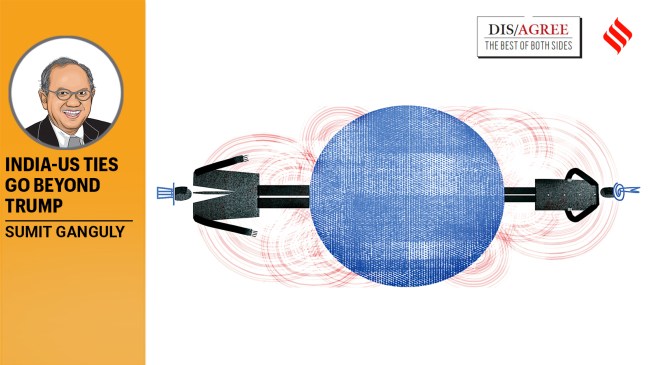Opinion Best of Both Sides: India must prioritise repairing ties with the US
The Indo-US relationship has weathered worse, and the current rupture should not overshadow the gains
 With Delhi-Washington ties under severe strain, India faces a moment of reckoning: Should it urgently repair ties with the US or exercise strategic autonomy, which gives it more options and flexibility? (Illustration by C R Sasikumar)
With Delhi-Washington ties under severe strain, India faces a moment of reckoning: Should it urgently repair ties with the US or exercise strategic autonomy, which gives it more options and flexibility? (Illustration by C R Sasikumar) US-India relations are now at their lowest ebb in decades. Since last week, a range of Indian exports has been subject to 50 per cent tariffs, wreaking havoc on a host of Indian industries running the gamut from jewellery to textiles. There is no way that these producers can easily switch to other markets and alleviate the pain that the tariffs have imposed.
The ostensible reason for the imposition of these tariffs is India’s willingness to purchase and refine Russian oil and then offer the product on the global market. However, according to informed news accounts, these stated grounds are rather disingenuous. Instead, the tariffs appear to have been inflicted largely because of the Modi government’s persistent denials that the Trump administration played a critical role in terminating the conflict between India and Pakistan in May.
Faced with these draconian tariffs, Prime Minister Narendra Modi is now turning to Russia and attempting to mend fences with the People’s Republic of China (PRC) as seen at the Shanghai Cooperation Organisation (SCO) meeting in Tianjin. To that end, he has met with presidents Vladimir Putin and Xi Jinping amid fanfare and apparent bonhomie.
This show of solidarity aside, as all three leaders face varied pressures from the Trump administration, it is unlikely that they will be able to overcome the significant differences that mark their ties. Russia, for example, is now the PRC’s junior partner in a striking reversal of roles since the heyday of the Soviet Union. The Indo-Russian relationship is now mostly one of convenience, based upon India’s continued dependence on Russian weaponry, petroleum products and a dose of Cold War nostalgia. Finally, the Sino-Indian rivalry remains alive and well despite the fervent efforts this month to paper over a host of structural tensions.
That said, it is not entirely surprising that New Delhi has reaffirmed its ties to Moscow and is seeking to ease the strains in its relationship with Beijing. US President Donald Trump’s tariffs, the concomitant uncertainties they have created for the business and investment environment in India, and current rumours that he may not attend the upcoming Quad summit in India in November have all, understandably, led New Delhi to consider other foreign policy options. Yet, the choices it is making under these conditions of duress may not prove to be optimal. Notwithstanding Trump’s harsh tariffs and the callous, boorish rhetoric of his trade counsellor, Peter Navarro, there are sound and compelling reasons for India to repair its partnership with the US.
At the outset, the pageantry at the SCO meeting in Tianjin is likely to be ephemeral. The underlying differences and tensions between India and China, and the Russia-China “no limits” partnership, cannot be wished away and will inevitably come to the fore. The task, then, for India’s policymakers is how to forge a foreign policy strategy that does not involve an inordinate reliance on the PRC and Russia while not wholly alienating the US. Such an approach will require much dexterity and skill, and the scrupulous avoidance of any diplomatic rhetoric that leads to the further deterioration of US-India relations.
There are sound reasons for not abandoning the Indo-US partnership. First, unlike during the Cold War, the relationship is not bereft of substance. Tariffs aside, the US and India have a viable trade relationship. Neither country, especially India, can afford to easily dispense with it. Second, since the momentous US-India nuclear agreement of 2008, albeit in fits and starts, the two countries have forged a robust defence and security partnership. Walking away from this carefully constructed strategic relationship will bode ill for their shared interests in maintaining a free and open Indo-Pacific, a theme that both sides have repeatedly reiterated. Third, decades ago, a noted American scholar of international politics, Robert Axelrod, had developed a concept, “the shadow of the future”. This notion, pared to its essentials, holds that states, even when confronted with an adversarial moment, should bear in mind that they will have to deal with each other in the foreseeable future. Accordingly, Axelrod argued that even if one party was intransigent at a particular juncture, the other party should not shut the door on future positive interactions.
Following the policy guidance that can be derived from his theoretical formulation, New Delhi should not adopt a bellicose stance toward Washington. Instead, it should, despite significant domestic pressures to the contrary, demonstrate a willingness to sustain the relationship. To that end, it should eschew any overheated public language, continue to maintain existing channels of communication with the United States and show a willingness to address the Trump administration’s stated concerns.
Pursuing any of these strategies under the current fraught circumstances will not be easy. Yet India must not allow the present upheaval in relations to determine the future of what has proved to be a mutually beneficial partnership. Most importantly, several Indian policymakers, who have long historical memories, will be aware that this relationship has weathered worse vicissitudes. These range from President Lyndon Johnson’s ill-conceived “short tether” policy on food aid during the Vietnam War at a time of a possible, looming famine in parts of India, to President Richard Nixon’s “tilt policy” toward Pakistan during the 1971 Indo-Pakistani war. The present moment in Indo-US relations, though undoubtedly trying, is a far cry from those dark episodes. The current rupture in US-India relations, while obviously concerning, should not be allowed to overshadow the progress that has been achieved over the past several decades.
The writer is a senior fellow and directs the Huntington Programme on strengthening US-India relations at the Hoover Institution, Stanford University






